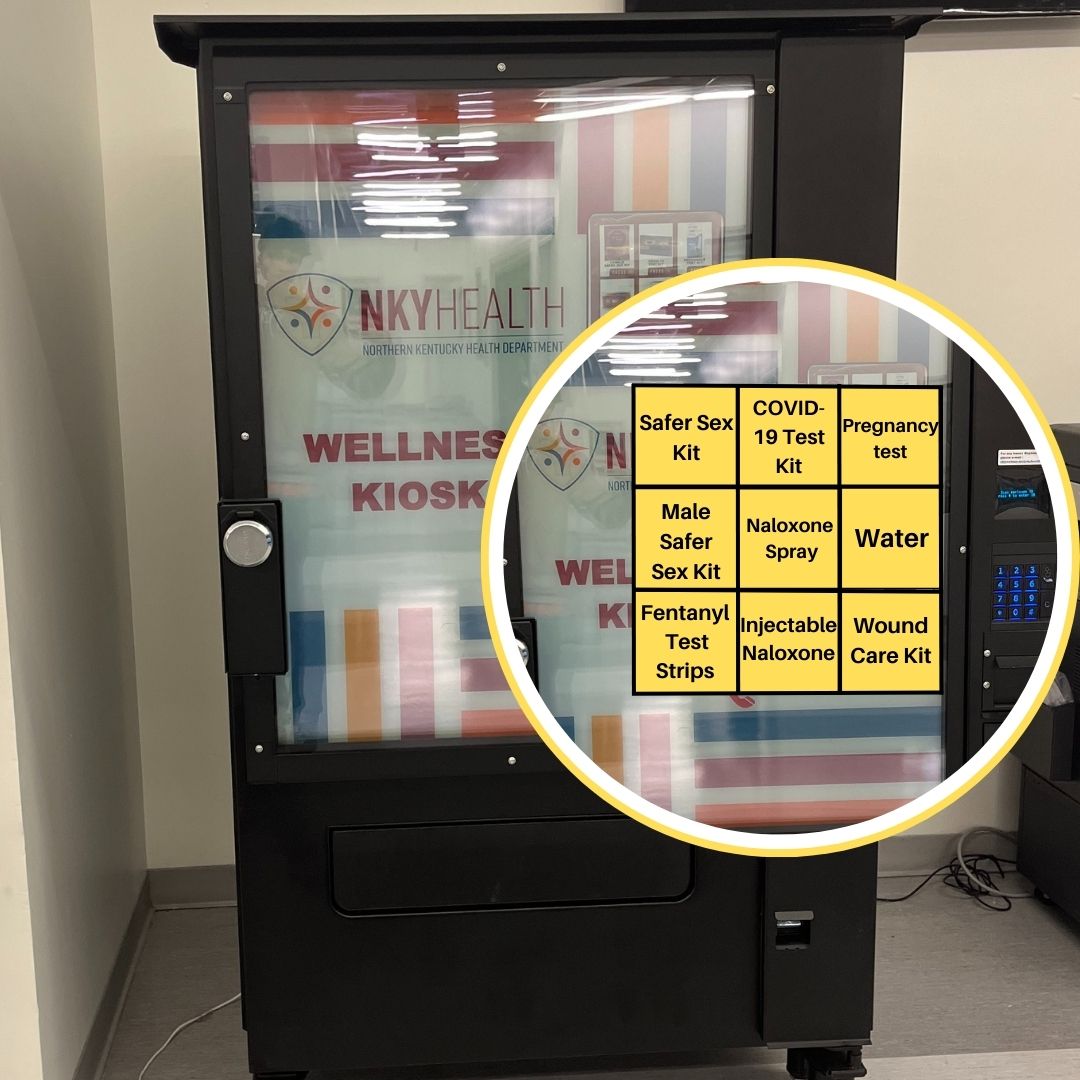
A new “vending machine” has been added to Norse Commons, but it doesn’t contain any chips or sodas. Instead, the products are health-related and free. Items like COVID-19 tests, wound care kits and even naloxone (Narcan) are provided in the Northern Kentucky Health Department kiosk and free for anyone on campus to utilize.
What is the kiosk?
While the kiosk is new to NKU, it has been in the works for the past year or so. The NKY Health Department worked with NKU to determine what products should be included, as well as what location it should be placed in… but where did this idea come from? According to Skip Tate, the health department’s public information officer, the machine’s purpose is to help create spaces where healthcare can be “easy and affordable.”
Kiosks like the one in Norse Commons are being used to provide resources to people in areas where there may not be convenient healthcare options.
“We’re trying to fill a gap,” said Tate.
The health department is currently working on placing a total of four to six of these kiosks in the Northern Kentucky area, each catering toward the needs in the given area. One is already located in Grant County.
Why is it at NKU?
According to NKU’s Vice President for Health and Innovation Dr. Valerie Hardcastle, college campuses are full of young people who often are discovering what the world around them has to offer. With that often comes taking risks.
“A lot of it has to do with everything from – you’re now living on your own, many people, for the first time, so you’re experimenting… to your frontal lobes aren’t fully developed and so you can make some foolish decisions… to opportunity because there’s more things floating around on campus than I can tell you is floating around in my house,” said Hardcastle.
However, Hardcastle also noted that “young people, while they might be a bit more experimental… they’re also not stupid. They’re not interested in exacerbating the risk, they’re interested in mitigating whatever risky behaviors they might be engaged in.”
Although the demographic of people typically on college campuses may be inclined to partake in risky behaviors, having the kiosk on campus allows them to do so in ways that reduce some of that risk. Students are able to quickly and easily access any of the products in the kiosk right on campus.
Why Norse Commons?
“We went through a few spaces on campus trying to figure out what made the most sense and ultimately, I think Norse Commons is a great space because some of these items are now available throughout campus,” said Hardcastle. “It’s also better to have it where students live.”
Items like naloxone can be found in all major buildings on campus, and condoms can be found in a variety of places as well. Having these items located closer to the dorms increases their accessibility, said Hardcastle. Students can go to Norse Commons, which is closer to the majority of dorms, rather than heading across campus to the other available resources.
Who can use the kiosk?
Anyone on campus, including students, faculty and staff, are able to use the kiosk and its products for free. While some people may need the products for a certain reason, others may just want to be prepared.
Sophie Geraghty, a junior marketing major, said that she got Narcan spray and fentanyl test strips from the kiosk the first week it was open.
“I haven’t used the items, but I just thought that it would be extremely helpful to have them on hand,” Geraghty said. “It honestly eases my mind knowing I have resources to help protect myself and my loved ones from the opioid epidemic.”
How does the kiosk work?
Just like any other vending machine, the kiosk is simple to use. Instead of paying for the supplies in the kiosk, there is a pin that gets entered into the machine first. The pin was sent out in a campus-wide email from Director of University Communications Tom Ramstetter on Feb. 12. Once the pin has been entered, you select the number associated with the product you want to obtain. The item is then dispensed for you to take, free of charge.
 Over the last month, a total of 234 items have been taken from the kiosk with the most-used product being water bottles at a total of 80. The NKY Health Department collects and evaluates this data and makes changes to the kiosk as necessary. Within the first week, the department noticed that a total of 27 pregnancy tests were taken from the kiosk as opposed to 16 COVID-19 tests. In response, some COVID-19 tests were removed and replaced with more pregnancy tests to better fit the needs of those using the kiosk, according to Tate.
Over the last month, a total of 234 items have been taken from the kiosk with the most-used product being water bottles at a total of 80. The NKY Health Department collects and evaluates this data and makes changes to the kiosk as necessary. Within the first week, the department noticed that a total of 27 pregnancy tests were taken from the kiosk as opposed to 16 COVID-19 tests. In response, some COVID-19 tests were removed and replaced with more pregnancy tests to better fit the needs of those using the kiosk, according to Tate.

